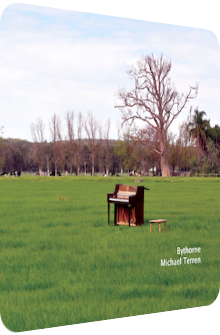
Michael Terren
Bythorne
2012
Bythorne is the debut work by the Perth-based pianist and electroacoustic adventurer Michael Terren. Released on the Sydneysider Flaming Pines label in October 2012 and available to buy and listen to in full via this Bandcamp link, the artist chooses an approach that differs much from his densely layered Drone tracks such as Tensions Are High At Basecamp which he contributed to a compilation called Woven for the Twice Removed label in the same month. Bythorne is a six-track EP full of piano arrangements and field recordings which Terren recorded directly at the Bythorne Farm, a place he regularly visited in his childhood. After a long drive of 125 miles, he then placed the piano in the fields of the farm and started to soak up the inspirations. And these are naturally manifold, especially so since childhood nostalgia meshes with chirping birds, convivial tone sequences as well as many surprisingly dark and mystified impressions. Since the Flaming Pines label is known for its dedication to birds and rivers, the listener can rightfully expect to find the flora and fauna in this EP as well, although in a curiously but intendedly altered form; more about this in the following paragraphs. Even though the liner notes mention mallet instruments and live electronics, I could not distill the former in any composition and was only able only pinpoint the lavish use of the latter in one particular track. Regardless of my incapability, the piano remains the characteristic core of each track. A deeper analysis of this refreshingly accessible artifact – in terms of the applicable Modern Classical genre categorization – is given below.
Cureakling, what ever this word, blending or location means, is the point of departure and starts in a gentle and refreshingly unceremonious way, namely with a field recording of the Australian Bythorne Farm that exposes the intrinsic backdrop of this release. Sure, the Flaming Pines label worships nature-related vignettes, but the slow unfolding of the expected field recording does not feel forced or interloped by the label's thematic priority. So before the first piano note even appears, the listener is surrounded by distant birds and their joyful chirps. The opening section is deliberately hazy. The listener is encapsulated, but not swallowed or enchanted rather than becalmed and soothed. After all, Terren wants to capture a perfectly normal day in a beautiful place. After about 20 seconds, the first staccato tones mesh with the omnipresent breeze, growing in volume, conflate with colder keys and a warm euphony in major. The duality of the arrangement, however, seemingly grows and revs up both the pressure and exiguity. The warmth vanishes as the birds chipper more quietly, the monotonously hammered keys underpin the icier polyphony of the tercets which jump at the listener. The song fades out in an indifferent, irresolute state. With Cureakling, the West Australian pianist immediately avoids the cliché trap despite the well-known rural setting: instead of romanticizing or transfiguring the panorama, the music oscillates between being a part of the surroundings – the front cover is self-explanatory in this regard – and an opposition to the solemnity due to unexpected tone sequences and shifts in-between the purposeful monotony.
The perceived aura of twilight is diminished in the following track called These Ones. Comprising of blissfully spiraling piano chords in major and plinking frost patterns in higher regions, this arrangement is delicately uplifting, tremendously eupeptic and definitely catchy, even though it is not based on a melody that is easy to sing along with. While the notes are played in quick succession, incessantly floating and flowing, the majesty of this piece is never perturbed or lessened. A wonderful piano arrangement that focuses on the music-related side rather than sophisticated textural patterns. Up next is All Nine Of Them, and it is the dedicated counterpart to These Ones: It consists of a whirling maelstrom that is analogical to the elysian ebullience of the preceding track, but much darker, more vibrant and undoubtedly voluminous. It is by no means threatening or appalling, but inherits the energy and power of elemental forces such as sudden wind gusts or tempests. All Nine Of Them feels impressive, its impetus thankfully leaves room for euphoria and thermal heat. No birds are featured on this track. You seldom hear them during storms. The short Midiology clocks in below the two minute mark, but Terren makes sure to leave a lasting impression thanks to the applied post-processing methods such as hall and reverb which augment the mistiness and shadiness of the already pitch-black and ever-rumbling piano notes. Crossing the paths to Dark Ambient, Midiology feels cavernous, vault-like and abyssal. Not even a glimpse of facileness can be spotted. It is as if the pianist sat in the eye of a storm.
All is well again in the eponymous centerpiece Bythorne. For almost ten minutes, Michael Terren moves into Modern Classical climes and creates a mellifluous stream of driblets, short sustain phases and snugly warmth. Everything is peaceful and carefree. Scattered bird cries ennoble the listening experience. It is in this scintillating arrangement where the artist moves the focal point to Ambient music, but not of the Drone kind, for the golden thread of spiraling sequences is palpable here as well, but presented in a somehow silkened, streamlined, blurred and bolstered form, resulting in a gorgeously graceful transfiguration, i.e. the sentimental feeling that Terren neglected in the opener, but injects here in magnanimous amounts. Another purifying aspect of the title track Bythorne is the pianist’s main emphasis on one single mood. One might think that during ten minutes, the composition shifts, tilts and turns, but this is not the case. The aura and the lucency are much more important than cleverly convoluted phases. This is why I specifically link this track to the Ambient genre. The final track Dardyboys is built on another previously imperceptible mood: a blue-tinged melancholy. Allotted piano notes with long fade-out phases implicate an early morning scenery which is only partially eased by a distant river, wind stream or even passing cars. Sporadic birds grow in number as the song progresses. The EP has gone full circle, as the music seems to underline nature again. While nature and music are not perfectly in sync, Terren captures a heavy-hearted, plaintive mood and rounds off the different atmospheres and ambiances in a skillful way.
A piano EP at its heart, Bythorne unites the bird-focused approach of the Flaming Pines label with a truly meaningful place for its composer. Each of the six hymns displays a different mood, and while a trio – These Ones, All Nine Of Them and Bythorne – is based on the flow of upwards and downwards spiraling keys, Michael Terren makes sure that the variety is maintained, if not via the form, then through the acoustic color and timbre. The field recordings are altogether of a humble nature, never does the listener find him- or herself in the Bythorne Farm. A moiré effect is applied to the recordings, a truly high-plasticity life-like aura does not become apparent. This, I believe, is done on purpose, for it is foolproof for an experienced musician to come up with a flamboyant, colorful field recording, even when using equipment that is deemed less than stellar by the audiophile connoisseur. No, there is a distant barrier between the listener and the Bythorne Farm. Terren lets the listener in, but only to a certain degree. Of further note are the occasional inconsistencies or antitheses which manifest themselves in the arrangement and the field recording: although there are instances where the peacefulness of the flora and fauna is of a sparkling, potentially blithesome quality, the perceived joy is not always perfectly matched by Michael Terren and his piano – and who else would be better suited to perceive these granular shifts than the composer himself? So why is this? It could well be that my yearning for chirping birds causes me to prefer a more cheerful melodious setup. Since these are delivered on this EP as well, I do not see the minor tones as flaws. A six-track work full of saccharine anthems in major is not exactly the kind of music I seek either. Bythorne is a great EP or mini album for Modern Classical followers, but especially so for Ambient fans. Be aware, though, that this is no Drone album; only the way too short Midiology offers cotton-wool swabs of haze and fog in an otherwise enigmatic, eerie surrounding. Michael Terren is confidently strolling in both the Modern Classical and the Drone world, but resides much more in the former. The front artwork really says it all.
Further listening and reading:
- Bythorne is available via this Bandcamp link where you can also listen to it in full.
- Follow Michael Terren and the Flaming Pines label at Twitter: @MichaelTerren and @FlamingPines.
Ambient Review 172: Michael Terren – Bythorne (2012). Originally published on Jan. 16, 2013 at AmbientExotica.com.
